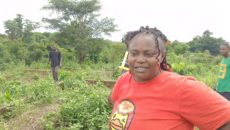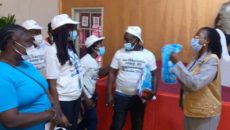MONROVIA, Montserrado – The World Bank on Wednesday, May 9, provided 12 vehicles to the Health Ministry to support its maternal, neonatal, and child health delivery services across the country.
According to a World Bank press statement, the vehicles presented include four ambulances and eight Jeeps that cost US$384,918.
The vehicles are Toyota Land Cruisers with some modified to carry patients and will be deployed in Montserrado, Margibi, River Cess, River Gee, Lofa, Gbarpolu, Sinoe, and Bomi.
The project is being implemented by the United Nations Population Fund while the World Bank provided the money for the purchase of the vehicles.
Speaking at the handing over ceremony, Munirat I. A. Ogunlayi, the World Bank Liberia’s health specialist, said the vehicles would contribute to improving access for skilled health care providers, thus contributing to reducing maternal and child mortality in the country.
According to the press statement, Ogunlayi expressed the need for the donation to be fully used by the ministry for the intended purposes.
The World Bank Liberia health specialist narrated a story of how she had met and helped a pregnant woman in labor who had walked two miles to reach the nearest health facility. She added that the pregnant woman was one of many who endured such problems.
Dr. Wilhelmina Jallah, the Minister of Health who received the vehicles on behalf of her ministry, lauded the World Bank and the United Nations Population Fund for the donation.

(Far right) Health Minister Wilhelmina Jallah commissioned the 12 vehicles by cutting a ribbon. Photo: Michael Sahr/World Bank
Jallah emphasized that reducing maternal mortality requires efforts of all sectors noting that “good roads for easy access, education, and others are very important.â€
The health minister assured the donors that the vehicles will be used for the intended purposes “through proper monitoring and maintenance.â€
The vehicles and ambulances are equipped with communication devices for referral and monitoring of maternal and child health services.
In addition to vehicle donation, the press release also noted that a US$3.3 million project had helped trained 284 health care providers in the delivery of emergency obstetric and neonatal care, while 18 health facilities across the country benefitted from equipment supply and renovation or construction of maternity places where required.
Featured photo by Michael Sahr/World Bank



